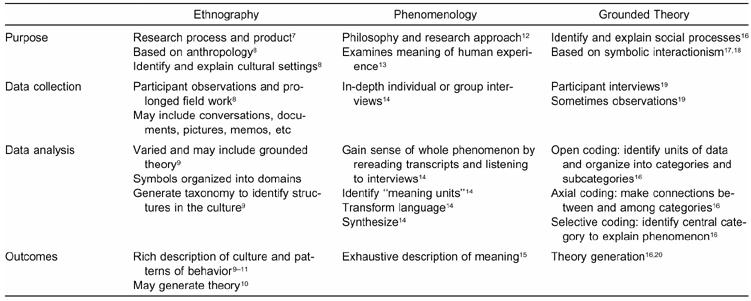

This involves the researcher moving in and out of the data collection and analysis process. The Grounded Theory Approach involves constant comparative analysis or what has come to be called the Constant Comparative Method. written protocols, charts, flowsheets, educational handouts) - materials used by members of the culture in their daily lives. Researchers using a grounded theory approach may also learn about a group or culture by collecting and studying artifacts (e.g. The types of interviews conducted by researchers using this approach vary in degree of formality (informal interview to semi-structured to structured interviews).Ĭollection of Artifacts and Texts. Talking with informants is called interviewing. Researchers using a Grounded Theory approach will learn about a culture or group by speaking with informants or members of the culture or group. This often requires extensive work in the setting being studied.

Participant Observation. This involves the researcher immersing him or herself in the daily lives and routines of those being studied. Grounded Theory is an approach for developing theory that is "grounded in data systematically gathered and analyzed" (Strauss & Corbin, 1994). Glaser and Strauss were arguing for an alternative approach, one that involves developing theories in a way that is connected to the data collection and analysis process. At the time, much of theory development was done a priori - before collecting and analyzing data. Glaser and Strasss articulate an empirical approach for developing theory. In fact, one of the goals of this book was to provide a 'legitimate' approach for doing qualitative research. In many ways, this book can be read and understood as a response to positivistic approaches in sociology. This book was written at a time when researchers in sociology were questioning the assumptions of positivism. In this review we outline the principles of grounded theory, and focus on thematic analysis as the analytical approach used most frequently in grounded theory studies, with the aim of providing clinicians with the skills to critically review studies using this methodology.The Grounded Theory approach was first articulated by Glaser & Strauss in their 1967 book The Discovery of Grounded Theory.

It is important to have an understanding of these in order to assess the applicability of this approach to healthcare research. Furthermore the stress upon grounding research in the reality of participants has also given it credence in healthcare research.Īs with all analytical approaches, grounded theory has drawbacks and limitations. The influence of grounded theory as an approach is, in part, based on its provision of an explicit framework for analysis and theory generation. Grounded theory has been one of the main contributors to the acceptance of qualitative methods in a wide range of applied social sciences. It is primarily an inductive process whereby theoretical insights are generated from data, in contrast to deductive research where theoretical hypotheses are tested via data collection. Grounded theory has developed as an analytical approach to qualitative data over the last 40 years. In today’s NHS, qualitative research is increasingly important as a method of assessing and improving quality of care.


 0 kommentar(er)
0 kommentar(er)
